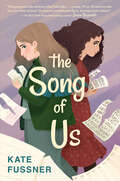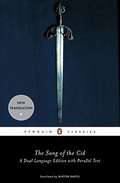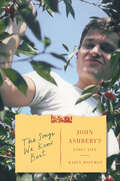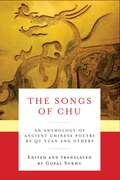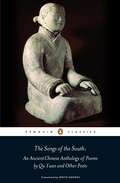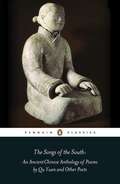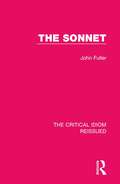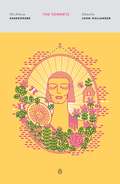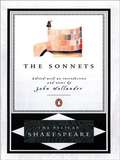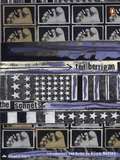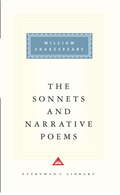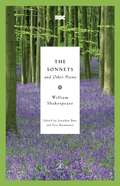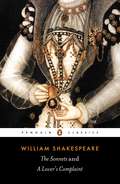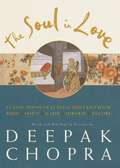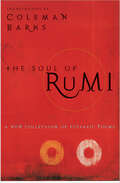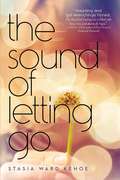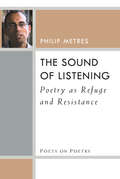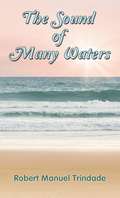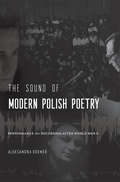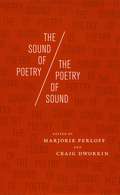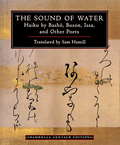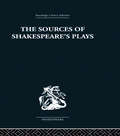- Table View
- List View
The Song of Us
by Kate FussnerThis stunning debut and wholly original queer middle grade novel-in-verse retelling of “Orpheus and Eurydice” adds a new chorus to the songs of great love, perfect for fans of Other Words for Home and Ivy Aberdeen’s Letter to the World.Love at first sight isn’t a myth. For seventh graders Olivia and Eden, it’s fate. Olivia is a capital-P Poet, and Eden thinks she wants to be a musician one day, but for now she’s just the new girl. And then Eden shows up to Poetry Club and everything changes.Eden isn’t out, and she has rules for dating Olivia: don’t call. Don’t tell her friends. And don’t let anyone know they’re together.But when jealousy creeps in, it’s Olivia’s words that push Eden away. While Eden sets out to find herself, Olivia begins a journey to bring Eden back—using poetry. Both Olivia and Eden will learn just how powerful their words can be to bring them together . . . or tear them apart forever.
The Song of the Cid
by Anonymous Maria Rosa Menocal Burton RaffelFrom a legendary translator: a magnificent new rendering of Spain's national epicVenture into the heart of Islamic Spain in this vibrant, rollicking new translation of The Song of the Cid, the only surviving epic from medieval Spain. Banished from the court of King Alfonso, the noble warrior Rodrigo Diaz, know as the Cid, sets out from Castile to restore his name. In a series of battles, he earns wealth and honor for his men and his king, as well as fame and admiration for himself. But it is in rescuing his daughters from their ill-suited marriages that the Cid faces the ultimate challenge to the medieval heroic ideal.
The Song of the Stone Wall
by Helen KellerAn unrhymed poem, fashioned from traditional style, first published in 1910 in which a rough, enduring old stone wall, that winds over hill and meadow, becomes a symbol of New England history. Its importance lies in the meaning it held for Helen Keller, and the strength she gained from its existence.
The Songs We Know Best: John Ashbery's Early Life
by Karin RoffmanThe first biography of an American masterThe Songs We Know Best, the first comprehensive biography of the early life of John Ashbery—the winner of nearly every major American literary award—reveals the unusual ways he drew on the details of his youth to populate the poems that made him one of the most original and unpredictable forces of the last century in arts and letters.Drawing on unpublished correspondence, juvenilia, and childhood diaries as well as more than one hundred hours of conversation with the poet, Karin Roffman offers an insightful portrayal of Ashbery during the twenty-eight years that led up to his stunning debut, Some Trees, chosen by W. H. Auden for the 1955 Yale Younger Poets Prize. Roffman shows how Ashbery’s poetry arose from his early lessons both on the family farm and in 1950s New York City—a bohemian existence that teemed with artistic fervor and radical innovations inspired by Dada and surrealism as well as lifelong friendships with painters and writers such as Frank O’Hara, Jane Freilicher, Nell Blaine, Kenneth Koch, James Schuyler, and Willem de Kooning. Ashbery has a reputation for being enigmatic and playfully elusive, but Roffman’s biography reveals his deft mining of his early life for the flint and tinder from which his provocative later poems grew, producing a body of work that he calls “the experience of experience,” an intertwining of life and art in extraordinarily intimate ways.
The Songs of Chu: An Anthology of Ancient Chinese Poetry by Qu Yuan and Others (Translations from the Asian Classics)
by Yuan QuSources show Qu Yuan (?340–278 BCE) was the first person in China to become famous for his poetry, so famous in fact that the Chinese celebrate his life with a national holiday called Poet's Day, or the Dragon Boat Festival. His work, which forms the core of the The Songs of Chu, the second oldest anthology of Chinese poetry, derives its imagery from shamanistic ritual. Its shaman hymns are among the most beautiful and mysterious liturgical works in the world. The religious milieu responsible for their imagery supplies the backdrop for his most famous work, Li sao, which translates shamanic longing for a spirit lover into the yearning for an ideal king that is central to the ancient philosophies of China. Qu Yuan was as important to the development of Chinese literature as Homer was to the development of Western literature. This translation attempts to replicate what the work might have meant to those for whom it was originally intended, rather than settle for what it was made to mean by those who inherited it. It accounts for the new view of the state of Chu that recent discoveries have inspired.
The Songs of the South: An Ancient Chinese Anthology of Poems By Qu Yuan And Other Poets
by Qu YuanThe Songs of the South is an anthology first compiled in the second century A.D. Its poems, originating from the state of Chu and rooted in Shamanism, are grouped under seventeen titles and contain all that we know of Chinese poetry's ancient beginnings. The earliest poems were composed in the fourth century B.C. and almost half of them are traditionally ascribed to Qu Yuan.
The Songs of the South: An Anthology of Ancient Chinese Poems By Qu Yuan and Other Poets
by Qu Yuan David HawkesDating from the second century AD, this anthology is the second-oldest collection of Chinese poems in existence. The poems, originating from the state of Chu and rooted in Shamanism, are grouped under seventeen titles and contain all that we know of Chinese poetry's ancient beginnings. The earliest poems were composed in the fourth century BC, and almost half of them are traditionally ascribed to Qu Yuan. In his introduction to this edition, David Hawkes provides a fascinating discussion of the history of these poems and their context, styles, and themes.
The Sonnet (The Critical Idiom Reissued #25)
by John FullerFirst published in 1972, this book examines the sonnet, one of the most complex yet accessible of verse forms. It traces its history, concentrating primarily on its technical development, and fully explains the differences between the Italian and English sonnet. The study looks at several different kinds of sonnet, including condensed and expanded sonnets, inverted and tailed sonnets and irregularities of metre and rhyme, and concludes with a survey of the sonnet sequence. This book will be useful to students of prosody and English poetry as well as those concerned with the practice of verse.
The Sonnets
by William Shakespeare John Hollander Stephen Orgel A. R. BraunmullerTogether with A Lover's Complaint' and little-known alternative versions of four of the sonnets. Edited with an introduction by Stanley Wells. ...the most beautifully printed text available.'
The Sonnets
by William Shakespeare Douglas BushTogether with A Lover's Complaint' and little-known alternative versions of four of the sonnets. Edited with an introduction by Stanley Wells. ...the most beautifully printed text available.'
The Sonnets
by Ted BerriganOriginally published in 1964, The Sonnets by Ted Berrigan is considered by many to be his most important and influential book. This new annotated edition, with an introduction by Alice Notley, includes seven previously uncollected works. Like Shakespeare's sonnets, Berrigan's poems involve friendship and love triangles, but while the former happen chronologically, Berrigan's happen in the moment, with the story buried beneath a surface of names, repetitions, and fragmented experience. Reflecting the new American sensibilities of the 1960's as well as timeless poetic themes, The Sonnets is both eclectic and classical - the poems are monumental riddles worth contemplating. .
The Sonnets
by William ShakespeareThe Sonnets is a collection of poems in sonnet form, written by William Shakespeare, that deal with different themes such as time, love and beauty, with new literary criticism and an updated bibliography.
The Sonnets and Narrative Poems
by William ShakespeareIf William Shakespeare had never written a single play, if his reputation rested entirely upon the substantial and sterling body of nondramatic verse he left behind, he would still hold the position he does in the hierarchy of world literature. The strikingly modern sonnets-intimate, baroque, and expansive at once; the invigorating narratives drawn from classical subjects; and the flawless lyricism represented by a poem like "The Phoenix and the Turtle"-permanently deepen our understanding of the multiplicity and extravagant energy of our greatest poet.(Book Jacket Status: Not Jacketed)
The Sonnets and Other Poems (Modern Library Classics)
by William ShakespeareShakespeare became famous as a dazzling poet before most people even knew that he wrote plays. His sonnets are the English language’s most extraordinary anatomy of love in all its dimensions–desire and despair, longing and loss, adoration and disgust. To read them is to confront morality and eternity in the same breath. Produced under the editorial supervision of Jonathan Bate and Eric Rasmussen, two of today’s most accomplished Shakespearean scholars, The Sonnets and Other Poems includes all of Shakespeare’s sonnets, the long narrative poems “Venus and Adonis” and “The Rape of Lucrece,” and several other shorter works. Incorporating definitive texts and authoritative notes from William Shakespeare: Complete Works, this unique volume also includes an expanded Introduction by Jonathan Bate that places the poems in literary and historical context and illuminates their relationship to Shakespeare’s dramatic writing. Also featured are key facts about the individual selections; an index of the first lines of the sonnets; a chronology of Shakespeare’s life and times; and recommendations for further reading. Ideal for students and general readers alike, this modern and accessible edition sets a new standard in Shakespearean literature for the twenty-first century.
The Sonnets and a Lover's Complaint
by William ShakespeareWhen this volume of Shakespeare's poems first appeared in 1609, he had already written most of the great plays that made him famous. The 154 sonnets - all but two of which are addressed to a beautiful young man or a treacherous 'dark lady' - contain some of the most exquisite and haunting poetry ever written, and deal with eternal subjects such as love and infidelity, memory and mortality, and the destruction wreaked by Time. Also included is A Lover's Complaint, originally published with the sonnets, in which a young woman is overheard lamenting her betrayal by a heartless seducer.
The Soul in Love: Classic Poems of Ecstasy and Exaltation
by Deepak ChopraNo love is more consuming and passionate than that one has for God. And nothing is more beautiful than that love when it is expressed as poetry. In The Soul in Love, Deepak Chopra presents us with five great writers whose lives span seven centuries: Rumi, the sublime Persian poet who sang out his verses in ecstatic longing for God; Mirabai, an Indian princess who walked away from her life of privilege to be closer to her Dark Lord; Kabir, born to a lowly family of weavers in India, only to rise to the heights of wisdom and song; Hafiz, an Islamic master who reveled in the joys of the flesh as a way to the soul; and Tagore, the celebrated modern Indian writer who first made the West aware of the richness of Eastern devotional poetry. Returning to the theme that inspired The Love Poems of Rumi and On the Shores of Eternity, Deepak Chopra gives us a rapturous experience of human passion, inspired by the soul’s yearning for the sacred source of love. "Immortal love doesn’t need poetry. However, it is our good fortune that some of the God-intoxicated have written words that permit access into their ecstatic world. Particularly in the East, in that exotically woven belt of lands that stretches from Arabia to the Indian subcontinent, poets and saints are never far apart. In this collection I have gathered a few of the most revered, beginning in the medieval period and extending to this century. The name of Rumi has gathered much luster recently, but the others — Kabir, Hafiz, Tagore, and Mirabai — deserve just as much recognition. In their own cultures they stand as beacons of inspiration, largely because the common people have taken them into their hearts and continue joyfully to sing their words to this very day." — From the Introduction
The Soul of Rumi: A New Collection of Ecstatic Poems
by Coleman BarksThe Soul of Rumi collects the poetry of the thirteenth century Persian mystic that explores the divine from the teachings of Sufism.Rumi’s masterpieces have inspired countless people throughout the centuries, and Coleman Barks’s exquisite renderings are widely considered the definitive versions. His translations capture the inward exploration and intensity that characterize Rumi’s poetry, making this unique voice of mysticism and desire contemporary while remaining true to the original poems. In this volume readers will encounter the essence of Sufism’s insights into the experience of divine love, wisdom, and the nature of both humanity and God.Rumi’s voice leaps off these pages with a rapturous power, expressing our deepest yearning for the transcendent connection with the source of the divine: there are passionate outbursts about the torment of longing for the beloved and the sweet delight that comes from union; stories of sexual adventures and of loss; poems of love and fury, sadness and joy; and quiet truths about the beauty and variety of human emotion. For Rumi, soul and body and emotion are not separate but are rather part of the great mystery of mortal life, a riddle whose solution is love. Above all else, Rumi’s poetry exposes us to the delight that comes from being fully alive, urging us always to put aside our fears and take the risk of discovering our core self.Barks’s fresh, original translations magnificently convey Rumi’s insights into the human heart and its longings with his signature passion and daring, focusing on the ecstatic experience of the inseparability of human and divine love.
The Sound of Letting Go
by Stasia Ward KehoeFor sixteen years, Daisy has been good. A good daughter, helping out with her autistic younger brother uncomplainingly. A good friend, even when her best friend makes her feel like a third wheel. When her parents announce they're sending her brother to an institution--without consulting her--Daisy's furious, and decides the best way to be a good sister is to start being bad. She quits jazz band and orchestra, slacks in school, and falls for bad-boy Dave. But one person won't let Daisy forget who she used to be: Irish exchange student and brilliant musician Cal. Does she want the bad boy or the prodigy? Should she side with her parents or protect her brother? How do you know when to hold on and when--and how--to let go? "The Sound of Letting Go is deeply moving, fiercely honest, and always surprising. Stasia Ward Kehoe's characters are so real and complex, you won't want to let them go at the end. I loved this book!"--Barbara Dee, author of Solving Zoe, This is Me From Now On, Just Another Day in My Insanely Real Life, and Trauma Queen "Achingly beautiful, The Sound of Letting Go takes readers down a dangerous path while touching the heart and encouraging hope."--Elana Johnson, author of Possession, Surrender, and Abandon "Told in verse that is at once delicate and strong, lyrical and honest, Stasia Kehoe's The Sound of Letting Go is a moving contemporary story of the intense push and pull between the responsibility of family and the freedom of dreams."--Jessi Kirby, author of Moonglass, In Honor, and Golden "With captivating verse and a lyrical love story to match, The Sound of Letting Go will keep you hanging on, breathless and enchanted, until the very last page."--Gretchen McNeil, author of Possess, Ten and the forthcoming 3:59 and the "Don't Get Mad" series "Soulful and stunning, this book has captured my heart. It's one of those tragic melodies you never want to end, a tribute to the damning and redemptive power of music."--Jessica Martinez, author of Virtuosity and The Space Between Us "The Sound of Letting Go draws you honestly into the turbulent ambivalence of life with a severely challenged sibling, while never short-shrifting Daisy's individual coming-of-age journey. The music of Stasia Kehoe's beautifully flawed characters will resonate in your mind long after you finish reading her book."--Elise Allen, author of Populazzi, co-author of the Elixir series with Hilary Duff
The Sound of Listening: Poetry as Refuge and Resistance (Poets On Poetry)
by Philip MetresPhilip Metres stakes a claim for the cultural work that poems can perform—from providing refuge to embodying resistance, from recovering silenced voices to building a more just world, in communities of solitude and solidarity. Gathering a decade of his writing on poetry, he widens our sense of poetry as a way of being in the world, proposing that poems can offer a permeability to marginalized voices and a shelter from the imperial noise and despair that can silence us. The Sound of Listening ranges between expansive surveys of the poetry of 9/11, Arab American poetry, documentary poetry, landscape poetry, installation poetry, and peace poetry; personal explorations of poets such as Adrienne Rich, Khalil Gibran, Lev Rubinstein, and Arseny Tarkovsky; and intimate dialogues with Randa Jarrar, Fady Joudah, and Micah Cavaleri, that illuminate Metres’s practice of listening in his 2015 work, Sand Opera.
The Sound of Many Waters
by Robert TrindadeOur beliefs determine how we behave personally, and also our lawful standards as well. Misplaced faith and worship has led many far from truth. God is not tolerant toward sin or the rejection of truth. His ways are not our ways, and wisdom and salvation only come through His way. Christ is the fulfilment of God's love for us and His word which is the guide.God has made Himself known to all through nature, His written word, and in the person of Christ. Our understanding and acceptance of God will determine our lives as individuals and as a society more than any other beliefs. God has set the standard for love and moral living, and when we honor Him, we will become what's needed by our fellow man. Wisdom and truth are God's, and all substitutes will not stand. Only in God should we trust.
The Sound of Modern Polish Poetry: Performance and Recording after World War II
by Aleksandra KremerAn illuminating new study of modern Polish verse in performance, offering a major reassessment of the roles of poets and poetry in twentieth-century Polish culture. What’s in a voice? Why record oneself reading a poem that also exists on paper? In recent decades, scholars have sought to answer these questions, giving due credit to the art of poetry performance in the anglophone world. Now Aleksandra Kremer trains a sharp ear on modern Polish poetry, assessing the rising importance of authorial sound recordings during the tumultuous twentieth century in Eastern Europe. Kremer traces the adoption by key Polish poets of performance practices intimately tied to new media. In Polish hands, tape recording became something different from what it had been in the West, shaped by its distinctive origins behind the Iron Curtain. The Sound of Modern Polish Poetry reconstructs the historical conditions, audio technologies, and personal motivations that informed poetic performances by such luminaries as Czesław Miłosz, Wisława Szymborska, Aleksander Wat, Zbigniew Herbert, Miron Białoszewski, Anna Swir, and Tadeusz Różewicz. Through performances both public and private, prepared and improvised, professional and amateur, these poets tested the possibilities of the physical voice and introduced new poetic practices, reading styles, and genres to the Polish literary scene. Recording became, for these artists, a means of announcing their ambiguous place between worlds. Kremer’s is a work of criticism as well as recovery, deploying speech-analysis software to shed light on forgotten audio experiments—from poetic “sound postcards,” to unusual home performances, to the final testaments of writer-performers. Collectively, their voices reveal new aesthetics of poetry reading and novel concepts of the poetic self.
The Sound of Poetry: The Poetry of Sound
by Marjorie Perloff Craig DworkinThe essays collected here by Marjorie Perloff and Craig Dworkin break that critical silence to readdress some of the fundamental connections between poetry and sound connections that go far beyond traditional metrical studies.
The Sound of Water: Haiku by Basho, Buson, Issa, and Other Poets
by Sam HamillHere are more than two hundred of the best haiku of Japanese literature translated by one of America's premier poet-translators. The haiku is one of the most popular and widely recognized poetic forms in the world. In just three lines a great haiku presents a crystalline moment of image, emotion, and awareness. This illustrated collection includes haiku by the great masters from the seventeenth to the early twentieth century.
The Sources of Shakespeare's Plays
by Kenneth MuirFirst published in 1977. This book ascertains what sources Shakespeare used for the plots of his plays and discusses the use he made of them; and secondly illustrates how his general reading is woven into the texture of his work. Few Elizabethan dramatists took such pains as Shakespeare in the collection of source-material. Frequently the sources were apparently incompatible, but Shakespeare's ability to combine a chronicle play, one or two prose chronicles, two poems and a pastoral romance without any sense of incongruity, was masterly. The plays are examined in approximately chronological order and Shakespeare's developing skill becomes evident.
